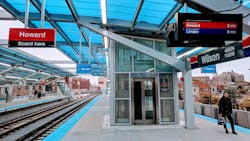FTA issues NOFO for rail station accessibility program
The Federal Transit Administration (FTA) issued a Notice of Funding Opportunity (NOFO) for $343 million available through the All Stations Accessibility Program (ASAP), which is one of four new programs established under the Infrastructure Investment and Jobs Act (IIJA) that was signed into law in November 2021.
ASAP will provide a total of $1.75 billion over the next five years to improve accessibility at the nation’s older rail stations that remain non-ADA compliant 32 years after the landmark Americans with Disabilities Act became law.
“While our country has made enormous progress in the three decades since passing the Americans with Disabilities Act, too many people with disabilities still don’t have access to reliable public transportation,” said U.S. Transportation Secretary Pete Buttigieg. “Using funds from President Biden’s Bipartisan Infrastructure Law, we are modernizing some of our oldest public rail stations and ensuring that more Americans count on our transit systems to get where they need to go.”
According to the National Transit Database, approximately 927 U.S. rail stations – about a quarter of all U.S. rail stations - are non-ADA accessible. However, when the data isolates legacy systems constructed prior to 1990, the percentage jumps to 48 percent being non-ADA accessible. Non-ADA accessible stations are found in urban areas, particularly in New England with New York City Transit accounting for more than one-third of the U.S. stations that are non-ADA accessible. Chicago Transit Authority, New Jersey Transit, Southeastern Pennsylvania Transportation Authority and Massachusetts Bay Transportation Authority each have dozens of stations that are not fully accessible.
“When the ADA was signed 32 years ago, it was supposed to consign ableism to the history books—but we still have a long way to go to ensure every corner of this country is actually, truly and fully accessible for the 61 million of us living with a disability,” said U.S. Sen. Tammy Duckworth (D-IL), who initially introduced the legislation as a stand-alone bill before the program was woven into the IIJA.
“I was proud to lead the effort to include the ASAP Act in the Bipartisan Infrastructure Law and I’m thrilled that the [U.S. Department of Transportation] is making ASAP funding available to transit agencies today—it will go a long way toward helping make the roughly 900 inaccessible rail and subway stations fully accessible to all Americans,” added Sen. Duckworth.
What ASAP aims to do
Metropolitan Transportation Authority has directed more than $5 billion in its 2020-2024 capital plan to station accessibility projects and recently reached an agreement under a class action lawsuit to make 95 percent of its stations accessible by 2055. Chicago Transit Authority also has a program to reach 100 percent accessibility at its stations over a 20-year period.
While existing programs take a steady approach over a long term, the grants through ASAP will provide dedicated funding for accessibility improvements that meet or exceed the standards included in the Americans with Disabilities Act. The activities include repairing, improving, modifying, retrofitting or relocating infrastructure of stations or facilities for passenger use, including load-bearing members that are an essential part of the structural frame, developing or modifying a plan for pursuing public transportation accessibility projects, assessments of accessibility or assessments of planned modifications to stations or facilities for passenger use or programs of projects in an eligible area. Additionally, technology upgrades, such as wayfinding, are also eligible for grants.
ASAP targets legacy rail systems where transit riders with support devices such as wheelchairs or crutches, people experiencing a temporary disability, caregivers and parents with strollers are adversely impacted by the lack of ADA accommodations.
"Equity depends on accessibility. FTA is committed to ensuring transit systems nationwide are available to people with disabilities and that they are able to use transit systems with the same ease and reliability as any other user," said FTA Administrator Nuria Fernandez.
----
Resources:
A pre-published NOFO is available at FTA’s website; deadline for submissions is Sept. 30, 2022.
The NOFO will be published in the Federal Register July 27, 2022.
FTA will hold two informational webinars on ASAP on Aug. 11, 2022, from 1:30 p.m. – 2:30 p.m. EDT and Aug. 16, 2022, from 1:30 p.m. – 2:30 p.m. EDT.
About the Author

Mischa Wanek-Libman
Group Editorial Director
Mischa Wanek-Libman is director of communications with Transdev North America. She has more than 20 years of experience working in the transportation industry covering construction projects, engineering challenges, transit and rail operations and best practices.
Wanek-Libman has held top editorial positions at freight rail and public transportation business-to-business publications including as editor-in-chief and editorial director of Mass Transit from 2018-2024. She has been recognized for editorial excellence through her individual work, as well as for collaborative content.
She is an active member of the American Public Transportation Association's Marketing and Communications Committee and served 14 years as a Board Observer on the National Railroad Construction and Maintenance Association (NRC) Board of Directors.
She is a graduate of Drake University in Des Moines, Iowa, where she earned a Bachelor of Arts degree in Journalism and Mass Communication.
